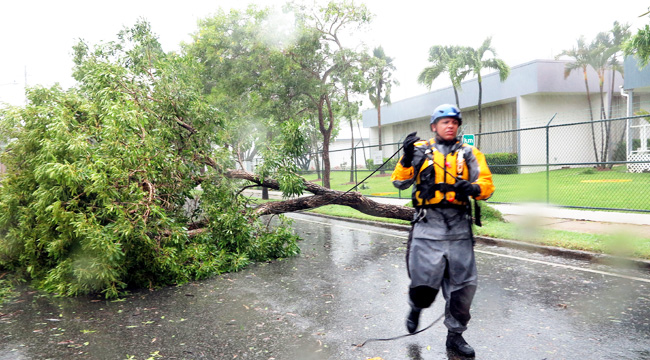
Irma’s still churning toward Florida as one of three active hurricanes in the Atlantic Ocean, although Jose and Katia (fortunately, and for now) are paling in comparison to the Category 5 monster. The storm has flattened 90% of Barbuda while isolating it from the outside world and leaving St. Martin in shambles. On Wednesday, Puerto Rico was spared a direct hit, but intense flooding and the threat of mudslides remains. And Puerto Ricans are feeling many other lasting effects as well.
So far, Irma’s Caribbean death toll stands at least 10 with that number expected to rise as waters recede and recovery commences in earnest. Eight of those people perished in St. Martin and St. Barts with one person losing their life in Anguilla and a 2-year-old dying in Barbuda. In St. Martin, residents lack power, clean water, and gasoline, and in economically crippled Puerto Rico, at least 1 million people could be without power for six months:
Ricardo Ramos, chief executive of the island’s electric utility, said about two-thirds of the island’s electric customers — more than 1 million — were without power late Wednesday. More than 56,000 people were without potable water.
Irma is only the latest setback for Puerto Rico, which has been ravaged by an economic crisis for the last decade. Its crumbling infrastructure means that parts of the U.S. territory could be blacked out for months, authorities warned earlier in the week.
Indeed, earlier estimates of how long Puerto Rico (a U.S. territory!) could be without power were almost optimistic in light of the new reality.
As for the future of Irma, the near certainty of a direct Floridian hit could also bring economic devastation to the U.S., seeing as FEMA’s coffers are almost completely dry in the wake of Hurricane Harvey. NBC News reports that the agency’s disaster relief fund has only $1.01 billion remaining, and all of that’s expected to disappear this week:
“FEMA is scheduled to run out of money by Friday, Sept. 8, just two days before Hurricane Irma is expected to hit Florida,” Florida Sens. Bill Nelson and Marco Rubio said in a joint statement. “Unfortunately, the current disaster relief package Congress is considering for Hurricane Harvey doesn’t account for the additional costs FEMA will likely incur as a result of Hurricane Irma.”
Although the House “overwhelmingly” passed $7.9 billion in further aid this week, that amount’s going entirely to victims of Hurricane Harvey. In other words, the strongest recorded hurricane in the Atlantic is about to strike the Sunshine State, and there’s not going to be any advance dollars pinpointed for recovery. Perhaps Congress can postpone the Wall? Who knows. Here’s an updated graphic on Irma’s current projected path, and U.S. mainland landfall is scheduled to go down on Sunday morning.
Irma is looking likelier to either direct hit Florida City/Miami about 8am Sunday or side swipe it, according to 5 am forecast 1/2 pic.twitter.com/fpoi0msfJe
— Marc Caputo (@MarcACaputo) September 7, 2017
